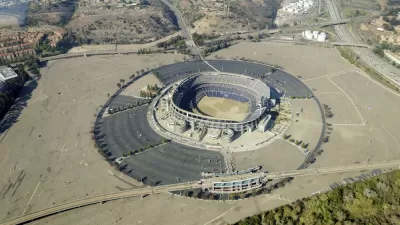Studies show building NFL stadiums drain tax revenues and don't boost local economies. What about NFL teams themselves? Land use attorney (and football fan) Bill Adams argues that they rob support from local college teams and local economies.
It's is not impossible for colleges to win or have great attendance with NFL teams next door. It's just harder. That's not good for the college teams, the college's educational and research programs, or the local economies that benefit from the college's presence, argues attorney and football fan Bill Adams.
Using his own city's (San Diego) NCAA and NFL football teams as examples, the latter of which maybe headed to Los Angeles, he cites several studies and articles to make a step by step case that: 1) colleges are important to local economies—much more so than NFL teams; 2) winning college football programs boost the number and quality of new student applications; 3) more and better new student applications result in greater funding and growth of the college; 4) the growth of the college increases the benefit to the local economy; 5) NFL teams compete with local colleges for football fans resulting in diminished attendance at college games; 6) diminished attendance means diminished support for college football; 7) diminished support means diminished success over the long haul; and 8) diminished football success reduces the number and quality of new student applications.
Obviously, a college's football program can still be successful with the NFL in town because a college can be successful without any football program. However, the presence of an NFL team is a negative pressure on a college's football program and, in turn, the college itself. It's an additional obstacle that some programs can overcome and some cannot. Therefore, if you are a football fan who likes both your NFL team and your college team, maybe its time to make a choice.
FULL STORY: Are the NFL Chargers causing the NCAA Aztecs to lose?

Alabama: Trump Terminates Settlements for Black Communities Harmed By Raw Sewage
Trump deemed the landmark civil rights agreement “illegal DEI and environmental justice policy.”

Planetizen Federal Action Tracker
A weekly monitor of how Trump’s orders and actions are impacting planners and planning in America.

The 120 Year Old Tiny Home Villages That Sheltered San Francisco’s Earthquake Refugees
More than a century ago, San Francisco mobilized to house thousands of residents displaced by the 1906 earthquake. Could their strategy offer a model for the present?

In Both Crashes and Crime, Public Transportation is Far Safer than Driving
Contrary to popular assumptions, public transportation has far lower crash and crime rates than automobile travel. For safer communities, improve and encourage transit travel.

Report: Zoning Reforms Should Complement Nashville’s Ambitious Transit Plan
Without reform, restrictive zoning codes will limit the impact of the city’s planned transit expansion and could exclude some of the residents who depend on transit the most.

Judge Orders Release of Frozen IRA, IIJA Funding
The decision is a victory for environmental groups who charged that freezing funds for critical infrastructure and disaster response programs caused “real and irreparable harm” to communities.
Urban Design for Planners 1: Software Tools
This six-course series explores essential urban design concepts using open source software and equips planners with the tools they need to participate fully in the urban design process.
Planning for Universal Design
Learn the tools for implementing Universal Design in planning regulations.
Clanton & Associates, Inc.
Jessamine County Fiscal Court
Institute for Housing and Urban Development Studies (IHS)
City of Grandview
Harvard GSD Executive Education
Toledo-Lucas County Plan Commissions
Salt Lake City
NYU Wagner Graduate School of Public Service





























